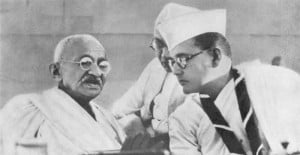-
Who Brought Freedom, Gandhi or Netaji? - Other Authors | hindujagruti.org
- Recent research shows that Netaji Subhas Bose and the INA were responsible for the British leaving in 1947 in a hurry. The Fall of Singapore to the Japanese in 1942 rather than Mahatma Gandhi’s Quit India Movement was the beginning of the end of the British Empire. Dr. N.S. Rajaram finds out more.

- I had occasion to visit some people who had served with my late father during World War II. Their account of their experience in the period from 1942 to 45 casts serious doubt on this beautiful story. Here we are faced with a dilemma— the conflict between what we read in history books and what the people actually saw on the ground. The usual story is that after some initial reverses the British defeated the Japanese. But those who actually served there, now in their late 70s and 80s, remember it quite differently. Uniformly, this is what I heard everywhere and from everyone.
- “When the Japanese attacked, the British ran away. They were very clever. They had a wonderful life with bungalows and butlers and cooks and all that, but as soon as the Japanese came, they ran away. And once they got back to India, they sent Gurkhas, Sikhs, Marathas and other Indians to fight the Japanese. They knew it was too dangerous for them. That is how we got independence in Malaya.” Malaysia was then called Malaya and Singapore was its capital.
- “That is why the British left India also. When the war was over, all the Indian soldiers who had defeated the Japanese returned to India, and the British got scared. They didn’t want to fight the Indians who had just fought and defeated the Japanese. So they ran away from India also.”
- The year 1942 was momentous. It was the year in which the British Empire suffered a massive defeat at the hands of an Asiatic people (Japanese); it was also the year in which Mahatma Gandhi launched his famous but ill-fated Quit India Movement. Subhas Bose also entered the picture at about that time, first in Germany and later in Southeast Asia. But first it is necessary to get an idea of the momentous impact of the Japanese victory on the psyche of the colonized people as well as on that of the colonizing powers. What triggered it was the Fall of Singapore.
- In the fall of Singapore, its symbolic significance was infinitely greater than the military defeat. It destroyed the myth of European superiority over the Asiatics once and for all.
- After the War, the British defeat in Singapore was followed by the French defeat in Dien Bien Phu at the hands of Ho Chi Min’s soldiers in Vietnam. This laid the groundwork for the American defeat in all of Vietnam and their inglorious flight from Saigon. No one today talks about the superiority of the ‘White Race’. The first nail in coffin was driven by the Japanese in Malaya in 1942.
- It was this changed perception, that the British were just ordinary mortals like the rest that allowed Netaji Subhas Bose to recruit Indians in Southeast Asia into the Indian National Army (Azad Hind Fauz or the INA). Subhas Bose saw that the Indian armed forces were the prop of the Empire— not just in India but everywhere the British went. But Gandhi and Nehru, preoccupied with their utopian dreams of nonviolence failed to realize its significance. When the opportunity arose, Bose seized it to transform the armed forces into a nationalist force, while Gandhi and Nehru started the Quit India Movement which collapsed in a few weeks.
- Another point worth noting: after the fall of Singapore that ended the British Empire, the most dramatic national event was the INA Trial at the Red Fort— not any movement by Gandhi or Nehru. This led to the mutiny of the naval ratings, which, more than anything helped the British make up their minds to leave India in a hurry. They sensed that it was only a matter of time before the mutiny spread to other parts of the armed forces and the Government. None of this would have happened without Subhas Bose and the INA.
- The crucial point to note is that thanks to Subhas Bose’s activities, the Indian Armed Forces began to see themselves as defenders of India rather than of the British Empire. This, more than anything else, was what led to India’s freedom. This is also the reason why the British Empire disappeared from the face of the earth within an astonishingly short space of twenty years. Indian soldiers, who were the main prop of the Empire, were no longer willing to fight to hold it together. This is the essence of leadership.
-
!! समर्थ हिन्दु, समर्थ हिन्दुस्थान !!;........................!! समर्थ हिन्दुस्थान, समर्थ विश्व !!............................ All the posts on this blog are re-postings and post headings point towards the actual posts.
Tuesday, October 13, 2009
Who Brought Freedom, Gandhi or Netaji? - Other Authors | hindujagruti.org
Who Brought Freedom, Gandhi or Netaji? - Other Authors | hindujagruti.org
2009-10-13T17:28:00+05:30
Common Hindu